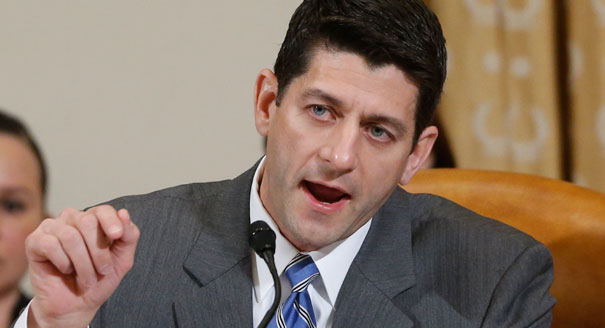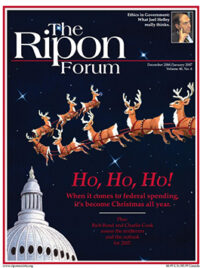
Of all the messages that voters sent this November 7, among the clearest was their demand for a change in the way Washington spends their tax dollars.
Highly publicized boondoggles – from the “Bridge to Nowhere” to an indoor rainforest museum in Iowa – have sparked public outrage in recent years and raised awareness of earmarks as a tool of influence and a conduit for overspending.
According to Citizens Against Government Waste, the federal government spent $29 billion on 9,963 pork barrel projects in fiscal year 2006, an increase of 6.3% from 2005, and an increase of over 900% since 1991. At the same time, a series of scandals have demonstrated how corrupt individuals, regardless of party, can abuse their power and manipulate the system in pursuit of personal gain.
The sole silver lining has been that, by demonstrating the extent to which our present spending process is broken, such waste and abuse have given real momentum to the drive for reform.
Of all the messages that voters sent this November 7, among the clearest was their demand for a change in the way Washington spends their tax dollars.
The effort to reform the federal budget process, including earmarks, has been a long-term project of fiscal hawks who take seriously Congress’ obligation to the taxpayers. When lawmakers enter Congress, they experience firsthand the frustration of trying to combat unnecessary spending within a system that is institutionally biased towards allocating money rather than saving it.
For example, under the existing congressional budget and spending process, if a congressman wishes to cut a wasteful pork barrel project from an appropriations bill and succeeds in amending the measure to do this, the savings must be channeled toward other government expenditures rather than debt or tax reduction. This and other incomprehensible policies that create a predisposition to spend tax dollars are the unfortunate legacy of the 1974 Budget Act, and this is what we must change if we are to bring lasting fiscal responsibility and accountability to Congress.
Among those with whom I have worked closely over the years to bring about this kind of reform are Representatives Jeb Hensarling, Chris Chocola, Jeff Flake, Mike Pence, and former Representative Chris Cox. Between 2002 and 2005, my colleagues and I introduced several comprehensive budget process reform bills to rein in spending, require greater oversight and accountability, and improve government accounting practices. Among the improvements we fought for were reforms to give Members of Congress and the President more effective tools to challenge wasteful earmarks and other frivolous spending items.
Specifically, our proposals enabling representatives to use points of order to enforce budget discipline and prevent unrelated spending from being tucked into omnibus appropriation bills, would have helped pare pork. Similarly, creating special budget protection accounts, as we urged, would have allowed Members of Congress to achieve true savings when they target unnecessary earmarks, directing the money saved toward deficit reduction or tax relief. Finally, our proposal to give the President expedited rescission authority so that he could pinpoint wasteful spending items in broad legislation and send these individual provisions back to Congress for a separate vote on their own merits, would have served as another key way for us to enforce fiscal discipline and discourage unjustifiable earmarks.
Despite the common sense nature of these reforms, enacting them has been an uphill struggle. In 2004, the House voted on our comprehensive budget bill as well as many of its individual elements, but most Democrats and some Republicans declined to support the needed changes. Expedited rescission, for instance, garnered 174 yes votes – a considerable show of support but insufficient to pass the measure.
The good news is that over the past two years, the public’s growing awareness of Washington’s spending problem has changed the landscape and improved our ability to win these reform votes. Majority Leader Boehner’s commitment to bringing these initiatives up for consideration on the House floor has also been a factor that has helped us make progress over the past year on earmark reform and related steps to restrain spending.
To prevent earmark abuse, we must shine sunlight on the budget and spending process in Congress from its early stages to the final moment when legislation lands on the President’s desk for signature. In other words, we need safeguards at both the front and back end of spending bills to ensure that everyone can find out what earmarks are included and who requested them, and give Congress and the President an effective means of working together to remove wasteful spending items before they become law. In fact, this is what a majority of the House voted for earlier this year.
The good news is that over the past two years, the public’s growing awareness of Washington’s spending problem has changed the landscape and improved our ability to win these reform votes.
In May 2006, the House passed legislation to bring greater transparency to earmarks as part of a broader lobbying accountability measure. When the House and Senate had difficulty resolving their differences on the lobbying bill, effectively stalling its progress, the House moved unilaterally to pass an internal rules change that at least makes House representatives more accountable for earmarks they request.
Under the new rule, all reported bills and conference reports – whether they are appropriations, authorization or tax bills – must include a list of earmarks, along with the names of the representatives who requested them. If the relevant committee fails to provide a list of earmarks, a Member of Congress can raise a procedural objection against consideration of the bill or conference report.
While this rule change is not as extensive as many of us would like, it’s still a major step toward bringing earmarks out in the open where they can be examined and challenged. Moreover, pairing earmark disclosure with a legislative line item veto, such as the bill I authored (H.R. 4890) which the House passed in June, creates a backstop that can be used to catch questionable earmarks at the end of the process and deter these requests in the first place.
My constitutional version of the line item veto enables the President to single out individual spending items in bills that reach him, put a temporary hold on this funding, and propose that Congress rescind it. The House and Senate would then have up to 14 legislative days to vote up or down, without amendment, on the President’s request. This keeps the power of the purse in Congress, where it belongs, while ensuring that rescission requests receive fast-track consideration and cannot be ignored. This measure closely resembles the expedited rescission provision that failed to pass the House in 2004, and the fact that this line item legislation passed easily by a vote of 247-172 shows how far we have come.
I am hopeful that the Democratic leadership of the 110th Congress will work with us to build on this positive momentum. House Speaker-to-be Nancy Pelosi has reportedly said the first agenda item will be a vote requiring earmark sponsors to be named. It would certainly be a welcome development if the incoming House leadership seeks to renew the earmark reforms we passed this fall.
Beyond this initial step, I believe there are many areas in which we can cooperate to prevent wasteful spending and live up to our responsibility to America’s taxpayers.
Paul Ryan represents the First District of Wisconsin in the U.S. House of Representatives.




